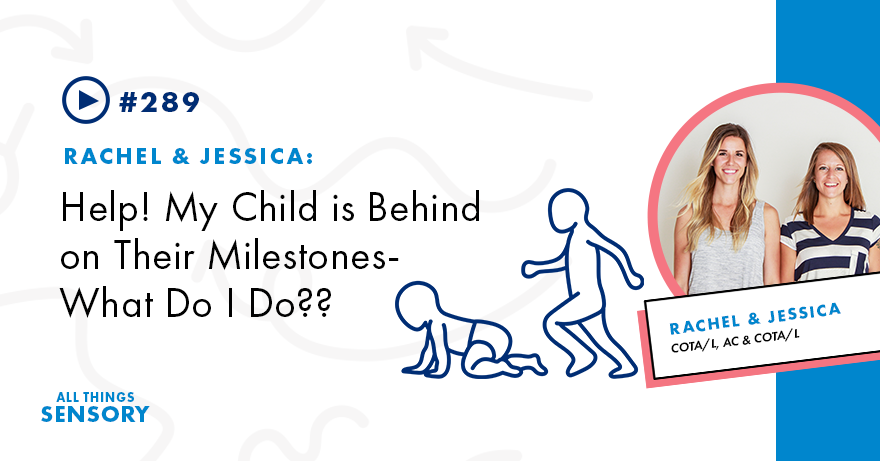Your Cart is Empty

Developmental delays can happen for a variety of reasons- there’s no one to blame and you are not doing anything wrong!
We’re going to share some of the typical developmental milestones so you can identify if your little one is on track or a little behind, what you can do to support their development, and who to reach out to and get more help from.
We dive into gross motor, fine motor, oral and feeding, speech, emotional, and social milestones. We also give you 2 activities to add into the daily routine within each category!
Infant and Toddler Sensory Development Digital Course
Make sure to check out all of our links below!
We’d love to answer your questions on the podcast! Fill out this form -> https://harkla.typeform.com/to/ItWxQNP3
All Things Sensory Podcast Instagram
Harkla Website - Shop Sensory Products!
Our Fav. Products for Infants and Toddlers
Everything You Need to Know About Infant Reflexes
As a parent, you might often be concerned about whether your child is hitting developmental milestones on time, a topic frequently discussed during pediatrician appointments. Understanding these milestones and how to support your child if their progress deviates from typical timelines is crucial.
When the connection between the brain and body is disrupted, it can lead to deviations from the typical developmental progress. Understanding developmental milestones is crucial for parents and professionals working with young children, as it enables the effective identification and addressing of delays.
Essential full-body movements that babies and toddlers should achieve within a month or two for these milestones.
By 3-4 months: Use both hands to bring objects to their midline.
By six months: Hold a block in each hand and clap them together while seated.
By 10-12 months: Start using a pincer grasp with thumb and index finger.
Between 13-16 months: Scribbling with markers or crayons and may start clapping.
By 17-20 months: Build a tower with six large blocks.
By age 2: Start imitating circular strokes, snipping with scissors, and throwing a ball at a target.
By age 3: Catch a playground ball with both hands.
By 4-6 months: Laughing and giggling.
By around seven months: Start imitating sounds.
Between 7-9 months: Intentionally look at objects, mimic pointing, repeat words, or imitate sounds. Stranger anxiety may peak with new people.
By 10-12 months: Begin using meaningful one- to two-word vocabulary.
By around 12 months: Understand basic phrases, follow simple commands, bring toys to share favorites, and show interest in dressing themselves.
By 14 months: Engage in interactive games and songs.
Between 13-16 months: Expect a vocabulary of 10 to 20 words, start repeating words from conversations, respond to questions, follow instructions efficiently, and engage in activities like pointing and clapping.
By age 2: Using two-word phrases and a vocabulary of 50+ words.
By age 3: Want strangers to understand about 75% of what the child is saying, ensuring their speech is clear.
Gross Motor Skills
Fine Motor Skills
Oral Motor and Feeding Skills
Speech, Emotions, and Social Skills
If you suspect your child is not reaching developmental milestones, articulate your concerns to a pediatrician or professional. Pay particular attention if you observe any of the following in your baby or toddler:
Remember, every child develops at their own pace, reaching milestones earlier or later than others. The key is to be aware of these milestones and seek help if you have concerns about your child's development.
Understanding and supporting your child's developmental milestones can significantly impact their growth and progress. By engaging in activities that promote gross motor, fine motor, oral feeding, speech, emotional, and social skills, you can help your child reach these milestones more effectively.
Always trust your instincts as a parent and seek professional help if you have any concerns about your child's development. Children can overcome delays and achieve their full potential with early intervention and support.
BORING, BUT NECESSARY LEGAL DISCLAIMERS
While we make every effort to share correct information, we are still learning. We will double check all of our facts but realize that medicine is a constantly changing science and art. One doctor / therapist may have a different way of doing things from another. We are simply presenting our views and opinions on how to address common sensory challenges, health related difficulties and what we have found to be beneficial that will be as evidenced based as possible. By listening to this podcast, you agree not to use this podcast as medical advice to treat any medical condition in either yourself or your children. Consult your child’s pediatrician/ therapist for any medical issues that he or she may be having. This entire disclaimer also applies to any guests or contributors to the podcast. Under no circumstances shall Rachel Harrington, Harkla, Jessica Hill, or any guests or contributors to the podcast, as well as any employees, associates, or affiliates of Harkla, be responsible for damages arising from use of the podcast.
Keep in mind that we may receive commissions when you click our links and make purchases. However, this does not impact our reviews and comparisons. We try our best to keep things fair and balanced, in order to help you make the best choice for you.
This podcast should not be used in any legal capacity whatsoever, including but not limited to establishing “standard of care” in a legal sense or as a basis for expert witness testimony. No guarantee is given regarding the accuracy of any statements or opinions made on the podcast.
Comments will be approved before showing up.